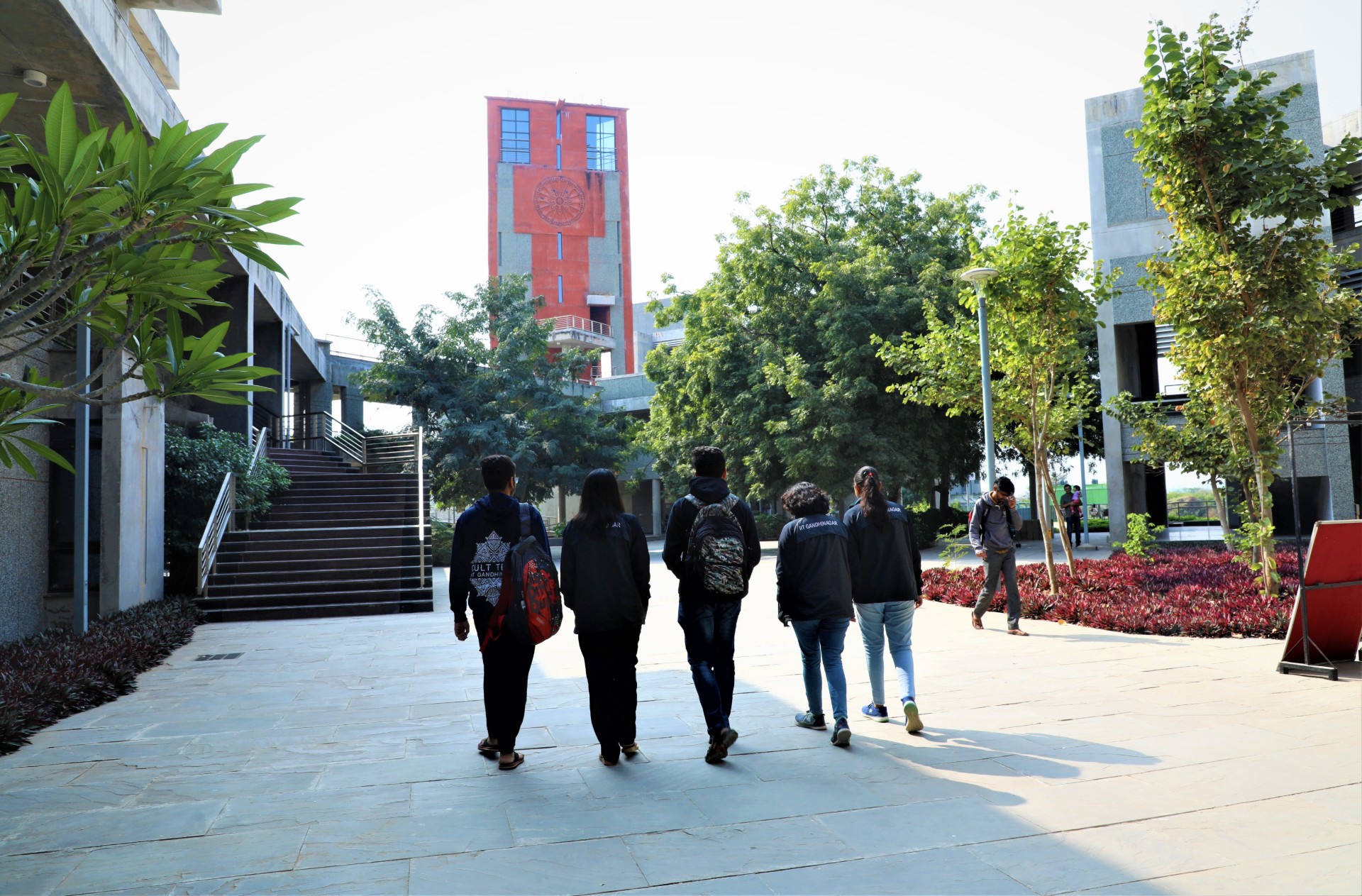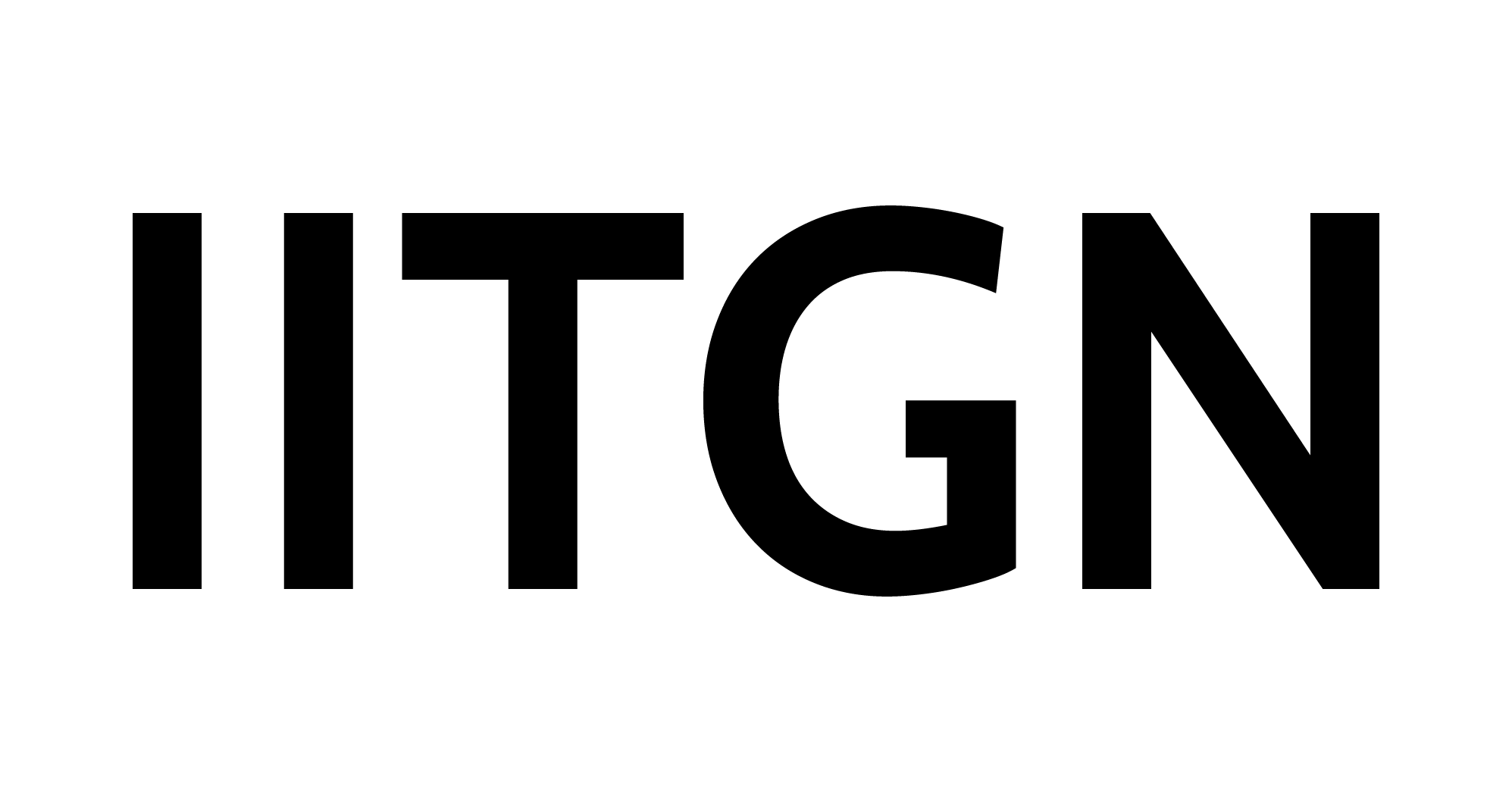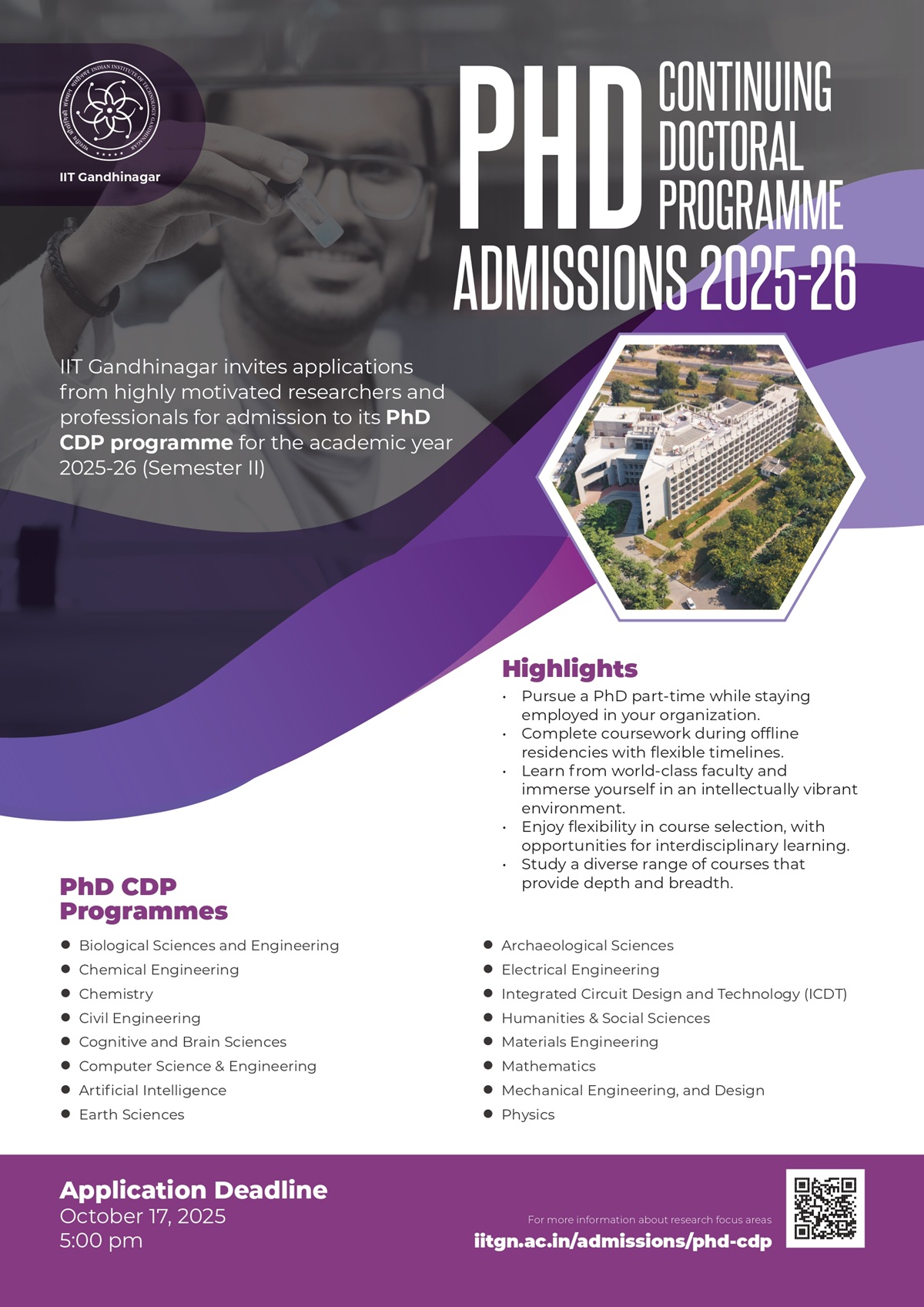Candidates Provisionally Shortlisted for written test and/or Interview of Ph.D.-CDP Programme 2025-2026 & Semester-2 Click here to View result.

PhD Continuing Doctoral Programme
IIT Gandhinagar invites applications from highly motivated researchers and professionals for admission to PhD Continuing Doctoral programme for the academic year 2025-26 (Semester II).
Currently, we offer PhD CDP programme in Biological Sciences and Engineering, Chemical Engineering, Chemistry, Civil Engineering, Cognitive and Brain Sciences, Computer Science and Engineering, Earth Sciences, Electrical Engineering, Humanities and Social Sciences, Materials Engineering, Mathematics, Mechanical Engineering, Physics.
Prospective students satisfying the eligibility criteria are encouraged to acquaint themselves with the research areas of our faculty members for suitable matches of interests.
Download BrochureImportant Dates
-
September 10, 2025
Application Opens
October 14
October 17, 2025
5:00 PM (IST)Application Deadline
24 to 27 October 2025
Announcement of the Shortlisted Candidates (tentative)
1 to 15 November 2025
Written test and/or interview
Research overview | List of Scholars | PhD — Find out more
-
Eligibility Criteria
Eligibility Criteria
Minimum of 55% marks (50% marks for SC/ST/PwD) or 5.5 CPI (5.0 CPI for SC/ST/PwD) in postgraduate degree programme or in 4-years bachelor degree programme in appropriate branches.
Above mentioned eligibility criteria is minimum at Institute level. The department-wise eligibility criteria can be found here. The departments may also use higher cut-off levels for shortlisting besides giving due consideration to the way questions are answered in the application form.Candidates belonging to SC/ST/PwD categories would be eligible for relaxations, as per norms, in the selection criteria.
The departments may also use higher cut off levels for shortlisting. Merely meeting the minimum eligibility criteria will not guarantee the shortlisting and/or admission.
-
Admission Procedure
Admission Procedure
Admission is generally offered on the basis of an interview, which is supplemented by a written test if necessary. The Institute will invite a limited number of candidates for a written test and/or interview based on the academic records, statement of purpose, etc. The final selection will be mainly based on academic credentials, written test and/or interview.
The mode (offline/online) and dates for the written test (if any) and interview will be communicated to the shortlisted candidates by their respective departments.
In addition to the announced admission cycles with prescribed deadline of application, the Institute also considers applications any time of the year in case of exceptional candidates. Based on the qualifications of the candidates and the need of the department concerned, applications received are processed through duly constituted selection committees at regular intervals. -
Application Procedure
Application Procedure
All applications must be submitted online. If you are applying for more than one discipline, please submit a separate application for each discipline. After successful submission of the application form, you will receive an application number and a link to download the application form. Please save the application form. You need to furnish a hardcopy of the application form and self attested copies of all the relevant documents at the time of interview. Incomplete applications will be rejected.
Application Fees: Rs. 150/- (SC/ST/PD Category), Rs. 300/- (Others)
You NEED NOT send the hard-copy of the application form. -
Important Dates
Important Dates
Application Opens - September 10, 2025 Application Deadline - October 14
October 17, 2025
5:00 PM (IST)Announcement of the Shortlisted Candidates - 24 to 27 October 2025 Written test and/or interview - 1 to 15 November 2025 -
Focus Areas
-
Biological Sciences and Engineering
1. Computational Biology, Systems Biology, and AI in Biology
2. Nanomaterials for biosensing and therapeutic applications
3. Biomaterials in Drug delivery and implants
4. Bioplastics and other sustainable materials
5. Ultrasound (Imaging, Diagnostics, and Ultrasound-mediated therapy)
6. Plant biology (Development, Reproduction, Cell-cell Signaling, Biotechnology, Agriculture)
7. Structural Biology and Chemical Crystallography
8. Food Biochemistry, Food Science & Applied Nutrition
9. Diagnostic tools for organ transplants, burn injuries, and cancer -
Chemical Engineering
1. Reaction Engineering: Heterogeneous catalysis, Catalyst synthesis, Multiphase reactions
2. Process optimization and control: Process Engineering, Control, and Optimization, Cyber-Physical Systems for industrial manufacturing and buildings, Machine learning and data science
3. Pharmaceutical Engineering and drug delivery: Biomaterials, Stimuli-responsive hydrogels, nano-drug suspensions, microbubbles for drug delivery and ultrasonic imaging, Pharmaceutical powder processing, Crystallization of pharmaceuticals, polymorphic behavior of pharmaceuticals
4. Molecular simulations: Thermodynamics and Statistical Mechanics, Protein aggregation and protein folding, Biomolecular Simulations, molecular dynamic simulations for aqueous solutions of drug molecules
5. Water treatment: Waste-water treatment, Drinking water
6. Environmental science and engineering: Particulate matter and aerosols, Building energy management, indoor air quality, atmospheric transport, and transformation of pollutants
7. Advanced functional materials: Functional materials for CO2 capture and adsorption, Surface Engineering and Superhydrophobic surfaces, Colloids and Interfaces, Rheology, Supercapacitors and other energy storage devices
8. Polymer science and engineering: Polymer processing, polymer gels, polymer blends, Shape memory polymers, Smart polymeric materials, Polymer ionic liquids, Polymer nanocomposites
9. Nano & bio-engineering: Bio-printing, 3D printing, Synthetic biology, protein engineering, Hybrid nanomaterials, and biomolecules for agricultural applications -
Chemistry
1. Development of machine learning potentials for material simulations; electronic structure methods and Δ-ML models applied to organic solar cells and LEDs.
2. Simulations of bio-assembly at graphene–aqueous interfaces; computational studies of Ayurvedic formulations; carbohydrate interactions in biomolecular systems.
3. Sustainable Catalysis – Catalysis for CO₂ conversion to fuels, carbon capture and utilization, green hydrogen generation, and electrochemical energy systems.
4. Molecular Electrocatalysis – Electrochemical CO₂ reduction and nitrogen-to-ammonia interconversion via molecular catalysts.
5. Solid-State Energy Materials – Modular metal chalcogenides and topological materials for sustainable energy conversion (hydrogen evolution, CO₂ reduction, thermoelectrics).
6. Nanomaterials & Photocatalysis – Metal nanoparticle-based photocatalysts, solar-to-hydrogen conversion, single-particle spectroscopy, and optical studies of quantum dots and perovskite nanocrystals.
7. Small Molecule Activation – Catalysis with main-group and low-valent compounds; dinitrogen and CO₂ fixation using 3d-transition metal complexes.
8. Ultrafast Spectroscopy – Femtosecond laser spectroscopy to probe dynamics in solar energy and optoelectronic materials (perovskites, organic photovoltaics, molecular aggregates).
9. Organocatalysis – Design of novel organocatalysts for asymmetric synthesis of bioactive molecules.
10. Chemical Biology & Therapeutics – Molecular approaches to cancer therapeutics and drug discovery.
11. Organelle-Targeted Chemical Biology – Small molecules and nanoscale materials for organelle targeting in cancer.
12. Environmental & Food Chemistry – Adsorptive materials for environmental remediation, synthetic polymers, biocomposites, rare-earth and nitrogen harvesting, and detection/mitigation of food hazards. -
Civil Engineering
1. Geotechnical Engineering: Dynamic behavior of soils, soil liquefaction, suction and collapse of unsaturated soils, constitutive modeling of soils, geotechnical earthquake engineering, geosynthetics
2. Water Resources Engineering: Machine learning architectures for hydrological sciences, resilience of urban water distribution systems, land surface hydrologic modeling, remote sensing applications in hydrology, climate change impacts and risk assessment on water resources, dam breach and levee breach hydraulics, integrated urban water management, blockage/leak detection in pipes, modeling of floods and droughts
3. Structural Engineering: Fire engineering, tall structures, performance-based earthquake engineering of structures, probabilistic seismic hazard and ground motion characterization, seismic isolation of nuclear structures, structural health assessment and monitoring, resilience of infrastructure, computational solid mechanics, 3D concrete printing, topology optimization, multiscale material modeling, blast engineering
4. Environmental Engineering: Aerosols and air quality, indoor air quality, pollution mitigation
5. Transportation Engineering: Mechanistic modeling of flexible and rigid pavements, pavement-environment interaction, urban sustainability, AI/ML applications in transportation engineering
6. Construction Materials: Sustainable building materials, high-performance concrete, life cycle assessment, characterization techniques -
Cognitive and Brain Science
1. Learning, Memory
2. Motor Control, Movement Disorders, Rehabilitation, Visuo-motor control and processing,
3. Emotion
4. Attentional selection and control,
5. Visual Cognition, Embodied Cognition, Multilingual Cognition,
6. Robotics, Human Robot Interaction,
7. Decision Making,
8. Brain Connectivity
9. Body Representations and Tactile Perceptipm
10. Multisensory Plasticity in the Visually Impaired
11. Bilingual Processing and Mental Lexicon,
12. Language Acquisition
13. Multisensory Perception, Attention, & Working Memory,
14. Curiosity
15. Human-computer interaction and Brain-Computer interface
16. Precision Imaging & Neuroanatomy
17. Predictive brain modeling
18. NeuroAI
19. Meditation and Consciousness Studies
20. Deep phenotyping enabled precision biomarkers -
Computer Science and Engineering
1. Theoretical computer science, Computational complexity, Algebra and computation, Algorithms
2. Machine learning, Game theory, Quantum machine learning
3. Formal methods and verification
4. Natural Language Processing, Multilingual and Multimodal Modelling, Mechanistic Interpretability, Information Retrieval
5. Computer Vision, Computer Graphics, Deep Learning Applications for Vision and Graphics
6. Human-Computer Interaction, Brain-Computer Interface, Accessibility and Assistive Technology, Explainable & Human-Centred AI, Medical Imaging and Healthcare
7. Software Engineering using Generative AI, Empirical Software Engineering, Software Testing, Mining Software Repositories
8. System security, Web security, Usable privacy and security
9. AI hardware design, Processor design and validation, Hardware Security, AI for Hardware Design and Test
10. Graph neural networks, GNNs for citywide simulation
11. Computer Networks, Network Security, Distributed Systems, Cloud Computing, and Computer Architecture
12. Computational Sustainability, GeoAI, Health Sensing, Spatiotemporal AI, AI for Social Good -
Artificial Intelligence
1. Machine learning, Game theory, Quantum machine learning
2. Natural Language Processing, Multilingual and Multimodal Modelling, Mechanistic Interpretability, Information Retrieval
3. Computer Vision, Computer Graphics, Deep Learning Applications for Vision and Graphics
4. Human-Computer Interaction, Brain-Computer Interface, Accessibility and Assistive Technology, Explainable & Human-Centred AI, Medical Imaging and Healthcare
5. Software Engineering using Generative AI, Empirical Software Engineering, Software Testing, Mining Software Repositories
6. Graph neural networks, GNNs for citywide simulation
7. Computational Sustainability, GeoAI, Health Sensing, Spatiotemporal AI, AI for Social Good -
Archaeological Sciences
1. Environmental Archaeology, Geoarchaeology
2. Archaeology, Ceramic Petrology, Ancient Technology
3. Luminescence Chronology, Archaeobotany, Stone Age Archaeology, Vertebrate Palaeontology, Lithic Technology
4. GIS and Remote Sensing in Archaeology -
Earth Sciences
1. Climate Change, Water Resources
2. Carbonate Sedimentology
3. Seismic Hazard Analysis, Geodynamic Modelling, Statistical Seismology, Tectonics
4. Micropaleontology, Biostratigraphy, Paleobiology and Paleoclimate Reconstruction
5. Natural Hazards and risk, Remote sensing & GIS
6. Geothermal Energy
7. Reservoir modelling, Fluid flow in rocks, Fluid-rock Interaction, Geological CO2 sequestration, Ore Genesis
8. River Science, Human-river interactions, Earth Surface Processes (ESP), DEM Applications in ESP
9. Rock mechanics, Petrophysics, Structural Geology -
Electrical Engineering
1. Nanoelectronics, Nanoscale Semiconductor Devices, Nanotechnology, Advanced Semiconductor Devices, Emerging Memories, Multi-scale and Multi-physics modeling, Semiconductor device and process modeling, 2D Materials
2. VLSI Design, Computing in Memory for ML, AI Hardware, Hardware Security, Computer Architecture
3. Analog Circuits, High-Frequency Analog Circuit Design, Mixed-signal IC Design, Power Management IC (PMIC) Design, IoT Electronic System Design
4. Semiconductor Manufacturing, Computational Lithography
5. Biomedical Signal Processing, Human Computer Interaction
6. Computer Vision, Image and Video Processing, Computer Graphics, Deep Learning
7. Adaptive Signal Processing, Array Signal Processing, Audio and Speech Signal Processing
8. Control Systems, Estimation Theory
9. Power Systems and Smart Grid
10. Electrical Machines and Power Electronics
11. Smart power electronics for Renewable Energy Integration and Electric Vehicles
12. Photonic Sensors, Mid-infrared laser spectroscopy, Optical fibre sensors, AI and ML in photonics, Nanophotonics, Chip-based biosensors 13. Computational Electromagnetics, Electromagnetic Metamaterials, Antenna synthesis
14. Next-generation ultrasound imaging and therapy
15. Wireless Communication, Sensing, and Network Intelligence
16. Quantum information theory -
Humanities and Social Sciences
1. Development Economics, Water Economics
2. Game Design, Game Studies, Design and Technology Studies
3. Ethnoarchaeology, Ancient Indian Technologies, Northeast Indian Archaeology and Repatriation
4. Curiosity and Experiences of Exclusion -
Design
Game design: Game Design, Game Studies, Design and Technology Studies Educational Technology: Design for educational multimedia
-
Materials Engineering
1. Numerical modeling of metal additive manufacturing process; Numerical modeling of friction stir additive manufacturing; Heat transfer and material flow modeling of Solid Stir Extrusion process; Failure mechanism analysis of liquid reinforced composite materials"
2. Quantum materials and devices, flexible solar cells for "intelligent" fabrics, and 2D materials.
3. Hydrogen embrittlement, High entropy alloys
4. AI/ML-assisted accelerated alloy design, superelastic alloys for sealign application.
5. Materials Science and Engineering
6. Materials Sustainability; Non-Wetting Surfaces; Micro/Nano Patterning; Tribology; Corrosion; Advanced Ceramics -
Mathematics
1. Analytic Number Theory and Special Functions;
2. Functional Analysis;
3. Inverse Problems and Integral Geometry;
4. Partial Differential Equations;
5. Commutative Algebra;
6. Matrix analysis and Spectral graph theory;
7. PDE constraint optimization and inverse problem -
Mechanical Engineering
1. Thermofluids: Fluid Mechanics and Heat transfer, Multiphase flows (drops and bubbles), Compressible flows, Turbulence, Combustion and propulsion, Hydrogen Fuel cell Systems for Aerospace Applications, Hydrogen Fuel Cell Systems for Marine Applications, Hydrogen Fuel Cell Systems for Long Endurance eMobility, Energy Systems, Battery Thermal Management, Complex Fluids, Porous media, Boiling, Condensation and frosting.
2. Robotics and Dynamical Systems: Control systems, Robotics, Robot learning, Human-robot interactions, Soft Robotics
3. Theoretical and Applied Mechanics: Mechanical Systems Design, Dynamics and Vibrations, Solid Mechanics, Computational Mechanics, Mechanics of highly deformable structures, Failure and stress-strain response of materials, Mechanics of polymers and self-healing materials, Mechanics of Biological Growth, Composites & Granular Materials. -
Physics
1. Theoretical High Energy Physics, Hot QCD matter, Heavy quark dynamics in hot QCD medium
2. Theoretical HEP : Scattering amplitudes, string theory, conformal field theory
3. Theoretical Condensed Matter Physics: Strong correlations, Quantum transport, Superconductivity, Magnetism, Topological phases in quantum materials
4. Experimental soft condensed matter physics, optics (holographic optical tweezers), Anisotropic colloidal particles
5. Active Matter Physics (Experimental), Biophysics
6. Experimental condensed matter Physics: 2D materials, Weyl Semimetals, Quantum Materials, Low temperature physics and devices, Thin Film Growth by MoCVD, Single Crystal Growth
7. Nanomagnetism and spintronics (experiments+Theory): magnetic sensors, memories, and logic/neuromorphic devices
-
-
Norms
Norms
- Candidates admitted to the PhD programme under the CDP category can directly join the PhD programme.
- The residency requirement for the candidates will be the time required to do the course work offered offline. Further, the candidates are encouraged to spend at least two weeks every semester at IITGN to ensure steady progress in their PhD research work.
- The curricular requirements will be the same as that of a regular PhD programme.



